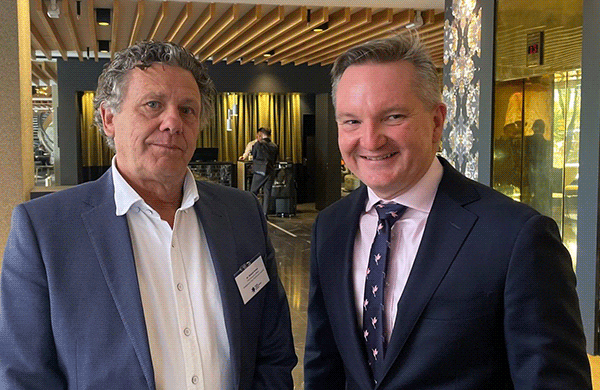IFDA calls for energy rethink as restaurants and food suppliers grapple with rising costs

Anthony Albanese’s energy policies face revolt from Independent Food Distributors Australia (IFDA), which supplies food to major supermarkets and thousands of cafes, restaurants and pubs.
The group is urging Labor to dump its 82 per cent renewables target, citing more than a 50% increase in energy prices since Labor gained power.
The IFDA, which use large chillers and freezers to store and supply food for 60,000 retailers, broke with other peak industry bodies in calling on the Albanese government to recalibrate its climate change agenda and focus on ramping up gas and coal production to bring electricity prices down.
The call directly contradicts Energy Minister Chris Bowen's assertion that renewable energy projects are the solution.
The call to action from the food sector preceded the first parliamentary sitting week of the year, during which the Labor government plans to legislate nearly $14 billion in production tax credits for hydrogen and critical minerals. However, facing pressure from mining interests and the West Australian government, the Prime Minister has abandoned plans to establish a federal Environment Protection Agency, citing concerns about potential development delays.
IFDA chief executive Richard Forbes said there was a “national energy emergency”.
“Based on the impact of the level of increase in energy pricing for food businesses, and the downstream impact for consumers … there should be a very serious look at the approach towards net-zero at present because of the damage that is being done.”
“It’s very clear … that the damage is affecting the viability of businesses and is affecting the ability of consumers to purchase the food that they would like.
“I don’t think it ever hurts to have a recalibration when people are hurting.”
IFDA’s 200 members, which employ 8500 people, believe coal-fired power generation is being phased out too quickly. Under Labor’s plan, there will be no coal generation from 2038.
“As far as I am concerned, the government’s energy policy has and continues to increase the price of food,” Forbes said.
“Food businesses are sick and tired of hearing the government saying they are doing something about the cost of living, when their costs, particularly energy costs, are soaring.
“The government must take responsibility for a portion of the cost-of-living crisis, which is the cost of doing business, which is energy.”
A spokesman for rejected the claim saying, “Extending them further would be a recipe for disaster. After a decade of neglect under the Liberals, energy prices for small businesses are too high and exposed to international shocks.
“That’s why we’ve prioritised getting energy prices down in the short and long term. We’ve delivered $650 in energy bill relief to small businesses — bill relief Peter Dutton fought against.”
Godden Food Group, which employs 130 people across NSW and Queensland and supplies food to major retailers like Woolworths and Coles, as well as hospitality venues, is facing significantly higher energy costs.
Managing Director Jeff Godden reports that their recently expired four-year energy contract has been replaced with a new deal reflecting a 238% increase for NSW storage facilities and a 90% increase for Queensland. As a result, Godden expects to pass on approximately half of these increased storage costs, leading to higher food prices for consumers.
“The government can make a smoke screen out of it all they like, about supermarkets gouging,” Godden said.
“The reality is, they don’t want to talk about the cost of energy and how it’s affecting that supply chain.”
Godden believes Australia should follow president Donald Trump’s lead and leave the Paris agreement.
Moco Food Services CEO Mike Peberdy, whose Brisbane-based company supplies 3,000 restaurants, cafes, pubs, and clubs, reported a 50% jump in his monthly electricity bill, now costing $45,000. He expressed concern about the industry's long-term viability.
“Businesses like ourselves and others in the industry make very, very low, single-digit net-profit margins It really does depend on high volume and so any increase in our input cost has to be passed on to the cost of the products that we sell.
“Very simply, our customers are paying more, and they then therefore have to charge more to their customers.”
New West Foods, Western Australia's largest independent food distributor, has seen its electricity bill double in the past three years, now exceeding $30,000 per month.
Managing Director Damon Venoutsos says the company serves 1,500 customers, including stadiums, fish-and-chip shops, schools, sporting clubs, airlines, and cruise ships. Venoutsos criticized the government's support of gas as merely "posturing," arguing that more action is needed to increase supply. While the company purchased land in 2021 for expansion, plans to build a new warehouse have been put on hold due to rising electricity costs.
“It is a threat to our growth operation, it is impeding growth,” he said.
“Our strategy was probably that (the new warehouse) would have given us about 30 to 40 per cent growth (in yearly revenue).
“We probably would have employed another dozen or so people.”
“In the interim, we’re going to have to do a lot more with gas, with coal in the system.”
Jonathan Jackson, 5th February 2025







